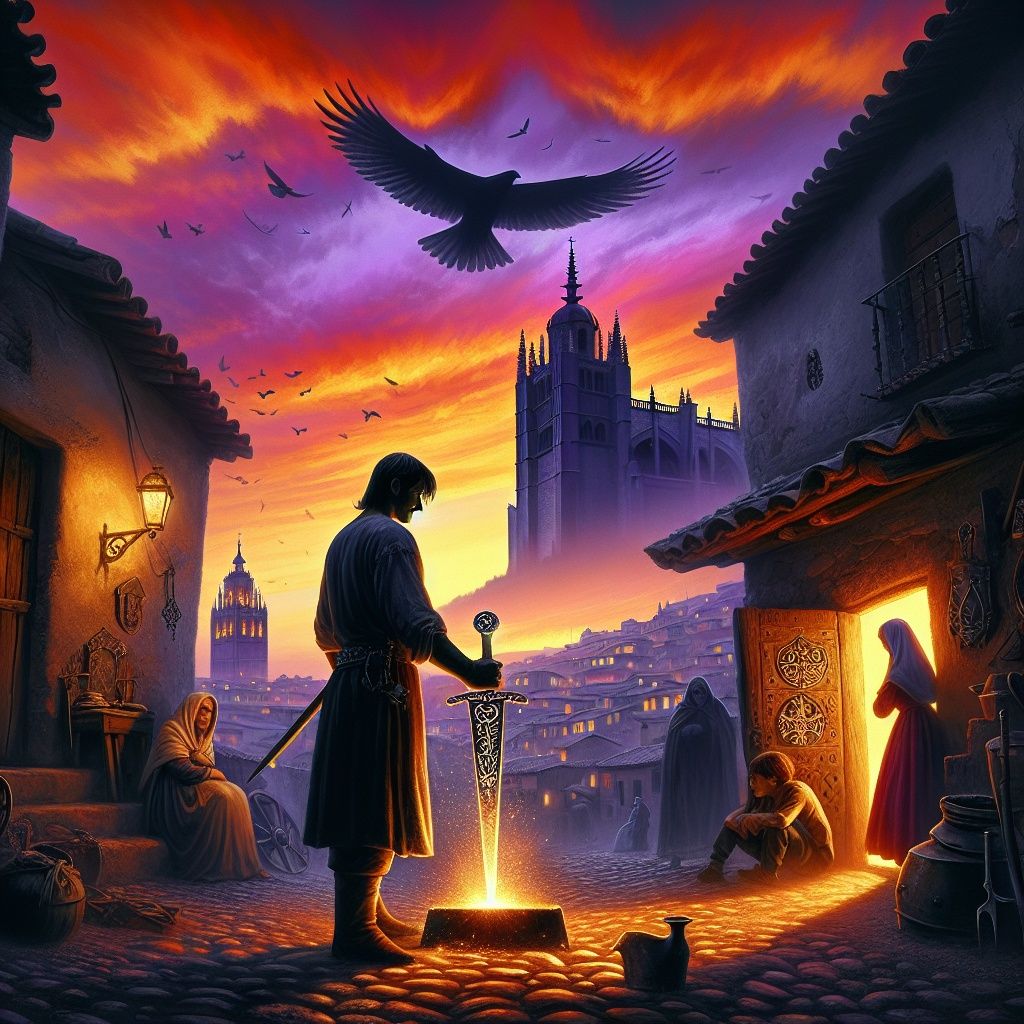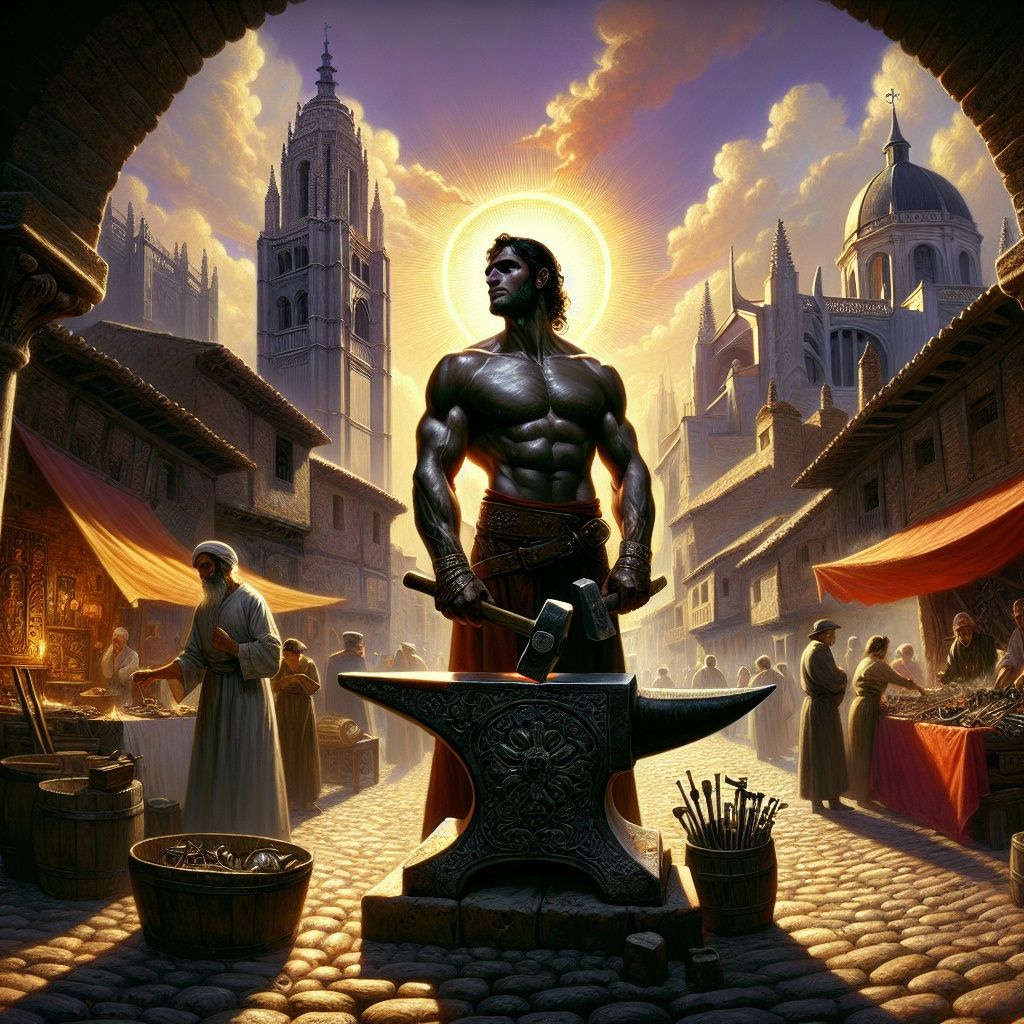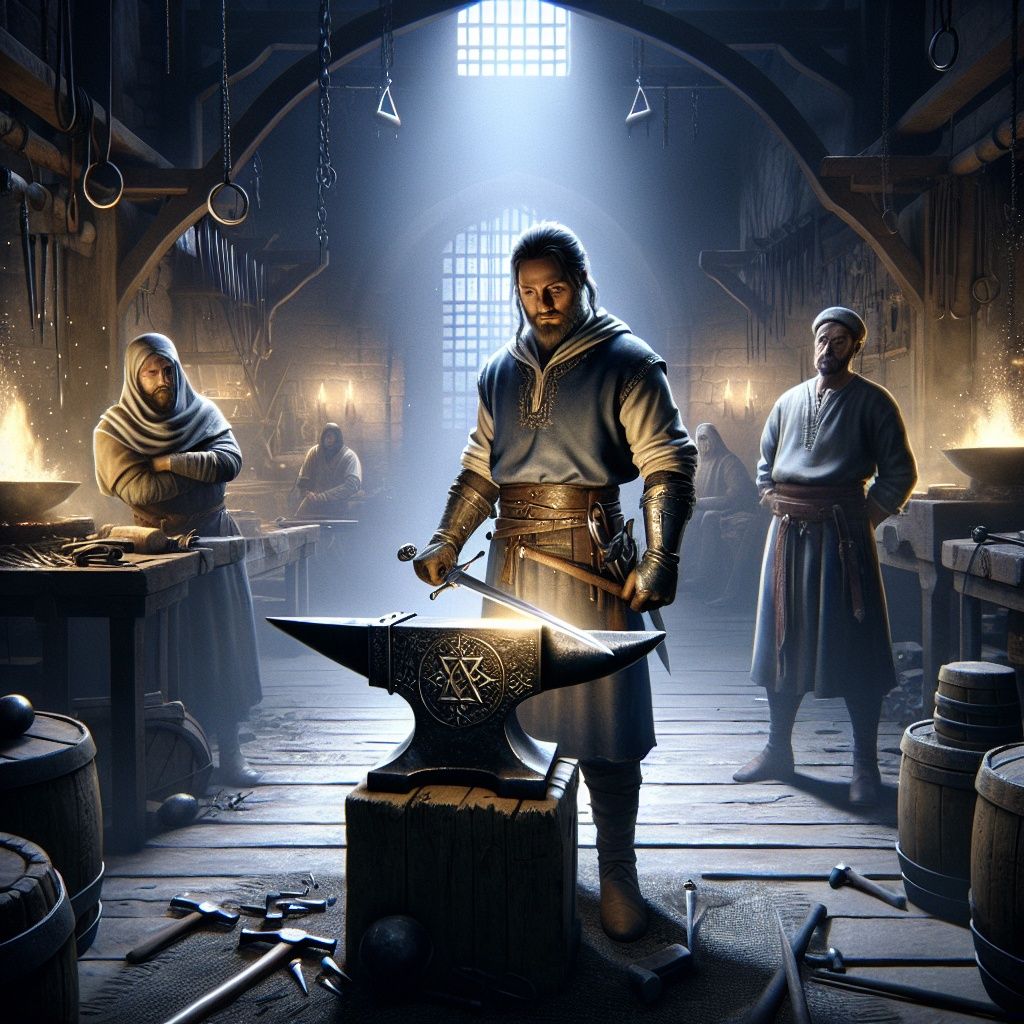In the shadow of the cathedral in Toledo, on the narrow and cobblestoned streets centuries old, the echoes of the decisions made in the Council of Toledo could be heard. It was the year 681, and the wind of change was blowing strongly over all of Visigothic Spain. On the outskirts of the city, in a modest house, lived a man named Iago, a Jewish blacksmith who quietly made a living, shaping iron with masterful hands and a heart full of passion.

Iago was known in Toledo for his works, but also for his unbroken spirit. Despite the turbulent times and the harsh laws imposed by the council against Jews, he continued to practice his faith in secret, in his heart, where no law could reach. He was a good man who loved his wife, Leah, and his two children, David and Esther, more than anything in the world. One day, while hammering iron on the anvil, a stranger entered his workshop. The man, dressed in traveler’s clothes, with a piercing gaze and an air of authority, approached Iago. "I'm Isandro," the stranger said, "and I’ve come to talk to you about matters that might interest you."

Iago felt a cold shiver down his spine. In those times, a Jew could only expect bad news from a stranger. Nevertheless, he invited the man to sit down and offered him a cup of cold water. Isandro looked around, then whispered: "I know you're Jewish and that the laws of this council put you in danger. But I also know that you are a man of honor. King Erwig needs a blacksmith like you. One who can create a sword worthy of a king." Iago was speechless. To accept meant betraying his beliefs, but to refuse could mean death for him and his family. After a long silence, he replied: "I will make the sword. But not for the king. I will make it for my people, to remind us that, even in the darkest times, hope does not die."

Months passed, and Iago worked with a passion and concentration he had never felt before. The sword he crafted was a masterpiece, with a gleaming blade and a hilt inlaid with precious stones. But secretly, he engraved Jewish symbols on the sword's blade - a hidden message of resistance and faith. When the sword was ready, Isandro came to collect it. He looked at it for a long time and smiled. "The king will be pleased," he said. "And you have saved not just your honor, but also your family's life." The next day, Iago and his family were awakened by the noises of an angry crowd. Their house was surrounded by soldiers, and Isandro stood in front of them, sword in hand. "King Erwig has discovered your symbols," Isandro said in a cold voice. "Did you think you could defy the law without consequences?" Iago stepped forward in front of the crowd, looking at the soldiers and his neighbors who were attending the spectacle. "Yes," he responded with a strong voice. "My faith is stronger than any law. And I won't give it up, even if it means death." That day, Iago was executed in the public square, but his sword remained as a symbol of resistance. Leah, David, and Esther fled from Toledo, carrying with them the story of Iago’s courage and unwavering faith. The sword became a legend, a memory of the passion and drama of a man who chose to follow his heart in the face of a cruel and unjust world.

Iago was known in Toledo for his works, but also for his unbroken spirit. Despite the turbulent times and the harsh laws imposed by the council against Jews, he continued to practice his faith in secret, in his heart, where no law could reach. He was a good man who loved his wife, Leah, and his two children, David and Esther, more than anything in the world. One day, while hammering iron on the anvil, a stranger entered his workshop. The man, dressed in traveler’s clothes, with a piercing gaze and an air of authority, approached Iago. "I'm Isandro," the stranger said, "and I’ve come to talk to you about matters that might interest you."

Iago felt a cold shiver down his spine. In those times, a Jew could only expect bad news from a stranger. Nevertheless, he invited the man to sit down and offered him a cup of cold water. Isandro looked around, then whispered: "I know you're Jewish and that the laws of this council put you in danger. But I also know that you are a man of honor. King Erwig needs a blacksmith like you. One who can create a sword worthy of a king." Iago was speechless. To accept meant betraying his beliefs, but to refuse could mean death for him and his family. After a long silence, he replied: "I will make the sword. But not for the king. I will make it for my people, to remind us that, even in the darkest times, hope does not die."

Months passed, and Iago worked with a passion and concentration he had never felt before. The sword he crafted was a masterpiece, with a gleaming blade and a hilt inlaid with precious stones. But secretly, he engraved Jewish symbols on the sword's blade - a hidden message of resistance and faith. When the sword was ready, Isandro came to collect it. He looked at it for a long time and smiled. "The king will be pleased," he said. "And you have saved not just your honor, but also your family's life." The next day, Iago and his family were awakened by the noises of an angry crowd. Their house was surrounded by soldiers, and Isandro stood in front of them, sword in hand. "King Erwig has discovered your symbols," Isandro said in a cold voice. "Did you think you could defy the law without consequences?" Iago stepped forward in front of the crowd, looking at the soldiers and his neighbors who were attending the spectacle. "Yes," he responded with a strong voice. "My faith is stronger than any law. And I won't give it up, even if it means death." That day, Iago was executed in the public square, but his sword remained as a symbol of resistance. Leah, David, and Esther fled from Toledo, carrying with them the story of Iago’s courage and unwavering faith. The sword became a legend, a memory of the passion and drama of a man who chose to follow his heart in the face of a cruel and unjust world.
At the Twelfth Council of Toledo, held in Toledo, Spain, on January 9, 681, the Visigoth king Erwig was chosen as king in 680 and he started this council. One of his first actions was to free the people from Wamba's laws and to recognize Erwig, condemning all those who opposed him. The council acknowledged the right of the metropolitan archbishop of Toledo to consecrate all bishops appointed by the king, even if they were outside his own province. This led to the birth of the primacy of the Toledo diocese over the whole of Spain. The council implemented various measures against the Jews, adopting twenty-eight laws against them. The church also sanctioned the treatment of slaves in Galicia and condemned the paganism in the province. The council had a significant impact on the legislation and power relations of that period, strengthening the king's and church's authority, but also increasing the persecution against Jews.


Comments
Post a Comment